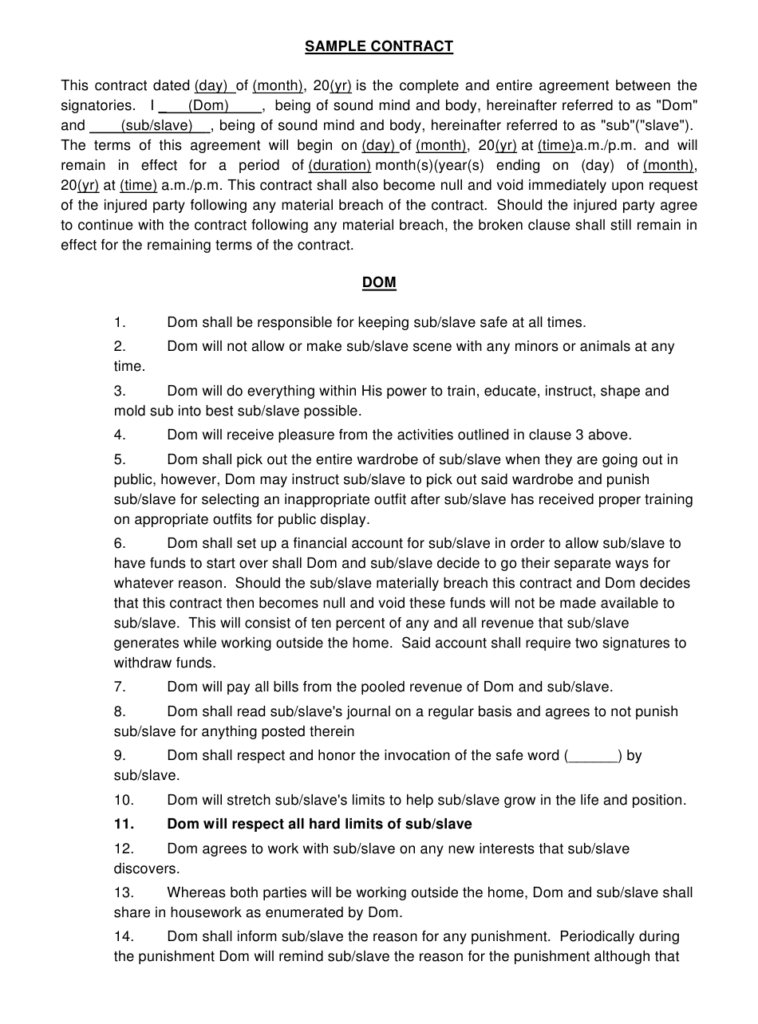- Good Surprises Vs. Bad Ones
- Red Flags & Warnings
- “No Contract Needed”
What are BDSM Contracts?

Ask anyone in any kind of relationship, and you’re going to hear that “communication is vital” to the success and health of that pairing – whether romantic, sexual, loving, platonic, etc. The same goes for BDSM play. Some would say (and I would agree) that communication is even more important when you get down and dirty in kinky ways.
A BDSM contract (with any kind of power exchange) is simply a tool that helps both parties (or all parties if that’s your groove) have a clear understanding and expectation of EVERYTHING necessary that surrounds their play/scene/situation etc.
Why Do We Need Them?

First of all, people can’t read minds. Second, we all have triggers and limits. Third, we want our sexy scenes to be fun, pleasurable, fulfilling, and even wonderfully painful. BDSM contracts help people explore their desires and engage in consensual power dynamics in a safe way with no “bad” surprises – and, yes, we’ll look at bad surprises later.
Contracts let both parties (or everyone – but from now on, I’m just going to refer to two people, but it can be any number) be on the same page. You’ll have a very CLEAR understanding of…
- Limits and boundaries
- Consent levels
- Rules and expectations
- Punishments and rewards
- Desires or curiosities
- Verbal and non-verbal safewords
- Goals (personal or otherwise)
- Moral authority
- Aftercare needs
- Termination policies
- And so much more
But, more than anything, it builds TRUST. Ongoing and open communication paves the road towards a deeper understanding of each other’s preferences. This will inevitably lead to a more intimate and enjoyable BDSM experience.
What Kinds of BDSM Contracts Are There?

Formal or Informal & Verbal or Written
How you craft your contract is entirely up to you and your partner. If you’re both veterans and have been playing for a long time, and it’s only a short, simple session, maybe a verbal contract is fine. Beginners might want to jot down notes on a piece of paper in a somewhat formal aspect.
But perhaps it’s a long-term BDSM slave contract. In that case, it would be something very formal, typed out in incredible detail, formatted like an actual contract, highly negotiated, signed, and possibly even accompanied by a ceremony.
There’s no right or wrong as to HOW you make your contract, as long as there is something that creates clarity and trust. And for anyone who says you don’t need anything, that’s a red flag (which we will talk about in detail later in the article).
Light Play or Beginner
These contracts are for those who are just starting out or aren’t doing any kind of heavy play. Maybe you’re just tying someone up and having sex with them. Maybe you’re trying a blindfold for the first time. Some might say they are shorter contracts and less formal, even verbal, but it’s up to the participants.
Scene Only
A “scene” is just one encounter. I won’t say it’s sexual, because it’s not always the case. Maybe it’s a submissive who just wants to be flogged at a BDSM party. However, it can involve sex – like someone wanting to be the center of a gangbang but having limits on anal.
The negotiation happens just beforehand. The sub usually has their own safeword the other side will remember as well as the limits they’ve been given. It’s very often verbal but can be written if it’s something someone does this play often and they want to be efficient in their communication.

Dominant & Submissive
Here’s where things can be a bit confusing. A Dom/sub COULD be a scene only or a long-term relationship. But the devil is in the details. A temporary Dom/sub contract is very different from a lifestyle contract. But the wording will be specifically Dom/Domme and submissive with different expectations than, for example, pet play.
Hard Play or Advanced
Players who have been in the kink scene much longer might have things they love to do that need more communication. Also, hard play comes with more risks. This needs thorough details – especially if one side is new to the pairing. Personally, I recommend written BDSM contracts for this stuff.
Master/Mistress & Slave
For me, the easiest way to understand the difference between a sub and a slave is that all slaves are subs – but not all subs are slaves. Slaves serve their Masters and gain pleasure from that service. They are owned and used. Submissives might not want to do these things. They might want to feel used or owned but not to the level of consensual slavery.
Professional
These contracts are for when someone partakes in the services of a professional Dominant. They will have their own contract ready which the other side will fill out with their own limits and desires etc. These are usually pretty comprehensive contracts.

BDSM Lifestyle
You’re living the life 24-7. So, it goes without saying that these contracts will be insane (in a great way). They should cover every tiny detail – especially if one or both sides are just starting out living this kind of life.
Online
Thanks to technology, people can play online. So, take whatever of these play styles and you can adapt a contract to fit the dynamics and limitations of an internet-only scenario.
Pet Play
Some people like to play as animals. But the brain is still human and there needs to be clear details on things like feeding times, sexual or non-sexual consent topics, bathroom breaks, toys, time limits, etc.
Who Does The Writing?
Generally, the Dominant writes the contract. It lends to the power aspect. However, if they are with a sub that has more experience with contracts or BDSM, then they can delegate them to gather the information, sort it, and deliver a copy to the Dom/me for review. After that, you can go to the negotiation part.
There’s also no shame in either side knowing what to do. Writing a contract together can be part of the bonding experience.
Is a BDSM Contract Actually Legal?

A BDSM contract could be dozens of pages long if you wanted/needed (especially if you include a kink checklist). There’s so much to think about, however, I found a free workaround on BDSMContracts.org. You would normally have to pay for the entire document, but the ToC of the image below is free. So it has plenty of ideas to help add your own clauses…
- Terms
- Goals
- Additional Rules
- Respect
- Rights of the Dominant
- Responsibilities of the Dominant
- Availability of the submissive
- Submissive’s behavior
- Communication
- Rights of the submissive
- Responsibilities of the submissive
- Areas of Control
- Submissive’s veto power
- Terms of exclusivity
- Limits
- Safewords
- Punishments
- Safety & compliance with laws
- Collar(s) & names for the submissive
- Confidentiality
- Alteration of contract
- Switching
- Entire contract
- Termination
- Necessary Declarations and Execution
- Schedule 1 – Goals
- Schedule 2 – Renewal
- Schedule 3 – Play activities and limits
- Schedule 4 – Punishment
- Schedule 5 – Additional rules
- Schedule 6 – Alteration of contract
- Scaled kink and sexual activity checklist
How to Review & Revise Your Contract

It’s a good idea to look things over first and then sit down and talk about each point. Have your head straight about what you want and don’t want. Both sides have rights to hard limits (yes, including Dom/mes) but there also can be things people are willing to experiment with to see if they like it. And after that, that section can be amended to a limit or moved to an accepted practice.
Living a kinky life (no matter what level or regularity) will grow and change. So, be prepared to CONTINUE to communicate. Have a slotted time in your contract to talk about any major updates or new feelings – or a clause that allows that conversation to happen anytime, etc.
For example, perhaps your loved one has to go on certain medications that reduce their libido, and their sexual capabilities are greatly reduced.
Something like this should never be punished, nor should the Dom or Top be selfish with their side. It should be discussed with the utmost support and changed to the contract made to reflect this life change. This might include changes in intimacy, going to therapy, or having one person use sex toys on the one who needs pleasure. There is always a mutually beneficial solution.
Other things to keep in mind…
- Leave some space within the contract for amendments
- Have clauses that foresee possible issues and solutions
- Short or verbal contracts can also be revised – e.g. during play with the use of a safeword
- Long-term of life long contracts should have a revision period built in at certain intervals
What Should I Be Wary Of?

Good Surprises Vs. Bad Ones
It’s fine for surprise sex or spankings etc. But no one wants to be taken off guard with an unreasonable punishment or something they can’t cope with (or worse, something traumatic). We don’t want conflicting behaviors and confusing situations – which is another important reason to have a contract.
So, one section that people might not think about including is what level of spontaneity a person can handle and what genre of surprises they are comfortable with receiving.
Red Flags & Warnings
Granted, it’s all about perspective (AND mutual consent), but I’ve seen some things in contracts that gave me pause. One example was, “My master has my health in mind. Therefore I cannot consume more than 1300 calories per day and must exercise 3 times a week and 2 hours per time.”
Unless the “Master” in the relationship is a doctor (and the slave has weight issues), no one should be restricting someone to a diet like that – especially while being active with exercise. I can understand something healthier (around whatever baseline is normal for the person’s height, age, sex, etc.), or having to stick to only healthy foods. But when I see something so irresponsible, the rest of the contract loses its validity.

It also doesn’t paint the picture of “I’m a caring master”. It screams, “I want to starve you so I can screw something skinny and have something pretty to take out and show off.”
Any dietary restrictions should be SANE (and consulted with a doctor before putting them into practice). Period.
Always remember, the contract is just a piece of paper. It comes down to both parties respecting the sane promises they’ve made. If you ever sign one, you’re still free to leave the relationship if you want – because BDSM is not abuse.
“No Contract Needed”
Another red flag is if someone says that a contract isn’t needed. I’ve seen these people online and even on YouTube videos. First, ignore these people. Whether it’s a brief conversation/agreement or an entire novel, it’s still a contract (and a necessary SCC practice). So if you’re a sub and the Dom “doesn’t believe in contracts” of any kind or a sub says they have no limits, then run for the hills. These are NOT healthy people to play with.
For one simple reason. If Person A wants some sort of contract to feel safe and have their needs and limits be clear, then any caring and responsible BDSM/kinky practitioner should have the basic human respect to honor that person’s wishes. It shows they truly want both sides to have a good time without worry or possible harm. Anyone who says any contract of any kind is not necessary (meaning any form of communication) is a fake player and possibly abusive.
BDSM Contract Example

Here’s a sample I found online. It’s more on the formal side, but it’s worth looking through and finding inspiration. IMPORTANT NOTE: I cut out a lot of extra stuff just to keep the general idea intact, but not bore you to death.
1.0.0 Slave’s Role
The slave agrees to submit completely to the master in all ways. The slave also agrees that, once entered, into the Slavery Contract, their body belongs to their master, to be used as seen fit, within the guidelines defined herein.
1.0.1 Slave’s Veto
The slave, where appropriate, holds veto power over any command given by the master, at which time they may rightfully refuse to obey that command. This power may only be invoked under the following circumstances, or where agreed by both master and slave:
- Where a command conflicts with any existing laws
- Where a command may cause extreme damage to slave’s life
- Where a command may cause permanent bodily harm to the slave
- Where a command may cause psychological trauma
2.0.0 Master’s Role
The master agrees to care for the slave, to arrange for the safety and well-being of the slave, as long as they own the slave. The master also accepts the commitment to treat the slave properly, to train the slave, punish the slave, love the slave, and use the slave as they see fit.
3.0.0 Punishment
The slave agrees to accept any punishment the Master decides to inflict.
3.0.1 Rules of Punishment
Punishment of the slave is subject to certain rules designed to protect the slave from intentional abuse or permanent bodily harm (see 4.0.0). Punishment must not incur permanent bodily harm, or the following forms of abuse:
- Blood may not be drawn at any time.
- Burning the body
- Drastic loss of circulation
- Causing internal bleeding
- Loss of consciousness
- Withholding of any necessary materials, such as food or water
4.0.0 Permanent Bodily Harm
Since the body of the slave now belongs to the master, it is the master’s responsibility to protect that body from permanent bodily harm. Should the slave ever come to permanent bodily harm during the course of punishment or in any other slavery-related activity, whether by intention or accident, it will be grounds for immediate termination of this contract, should the slave so desire. Permanent bodily harm shall be determined as:
5.0.0 Others
The slave may not seek any other master or lover or relate to others in any sexual or submissive way without the master’s permission.
6.0.0 Secrecy
All physical evidence of slavery will be kept in total secrecy, except where both master and slave agree.
7.0.0 Alteration of Contract
This contract may not be altered, except when both master and slave agree. If the contract is altered, the new contract shall be printed and signed, and then the old contract must be destroyed.
8.0.0 Termination of Contract
This contract may be terminated at any time. Upon termination, all physical evidence of the slavery, including this contract, will be destroyed.

Did you see the part that mentioned DEATH? Don’t freak out.
That doesn’t actually mean there’s a risk of dying. It’s all just an elaborate, theatrical way of promising, “I won’t let anything bad happen to you while you’re with me.”
And, as I said before, a lot of other stuff is missing – and is far from “complete” if you want to have a very thorough document. For example, mine has an extra attachment that lists a very long list of pretty much every sane kink you can imagine, the scale they are willing or desire to participate, and the desire or comfort to which I’m willing to participate. This file is kept for anyone who wants to play with me for more than a session.
Here is another sample with one page focusing on the Dom/mes responsibilities. I like this one because it shows how much responsibility a Dom must and should take on in something like a long-term or lifestyle contract.

This video has an interesting take on adding Rituals and Protocols into your BDSM sessions and even your contracts. If you like this idea, this video is for you. Or, if not, at least you might find something useful.

Other Vital Details & Closing Thoughts
The cornerstone of BDSM practices – SSC (Safe, Sane, Consensual) must be in play at all times. Then there is TRUST … and following through with what you’ve promised. Otherwise, the contract isn’t worth the paper it’s written on. Also, protect this document, especially if the other person requires a high level of privacy. When used properly, BDSM contracts are fantastic tools that help people with their sexy adventures!
Want More Helpful BDSM Articles?
- What is a Safe Word? Learn the Basics of Kink Communication
- Nonverbal Safe Words – Other Ways to Communicate
- BDSM vs Abuse – Learn the Differences and Stay Safe
Any other BDSM contract suggestions you want to add? Share in the comments!